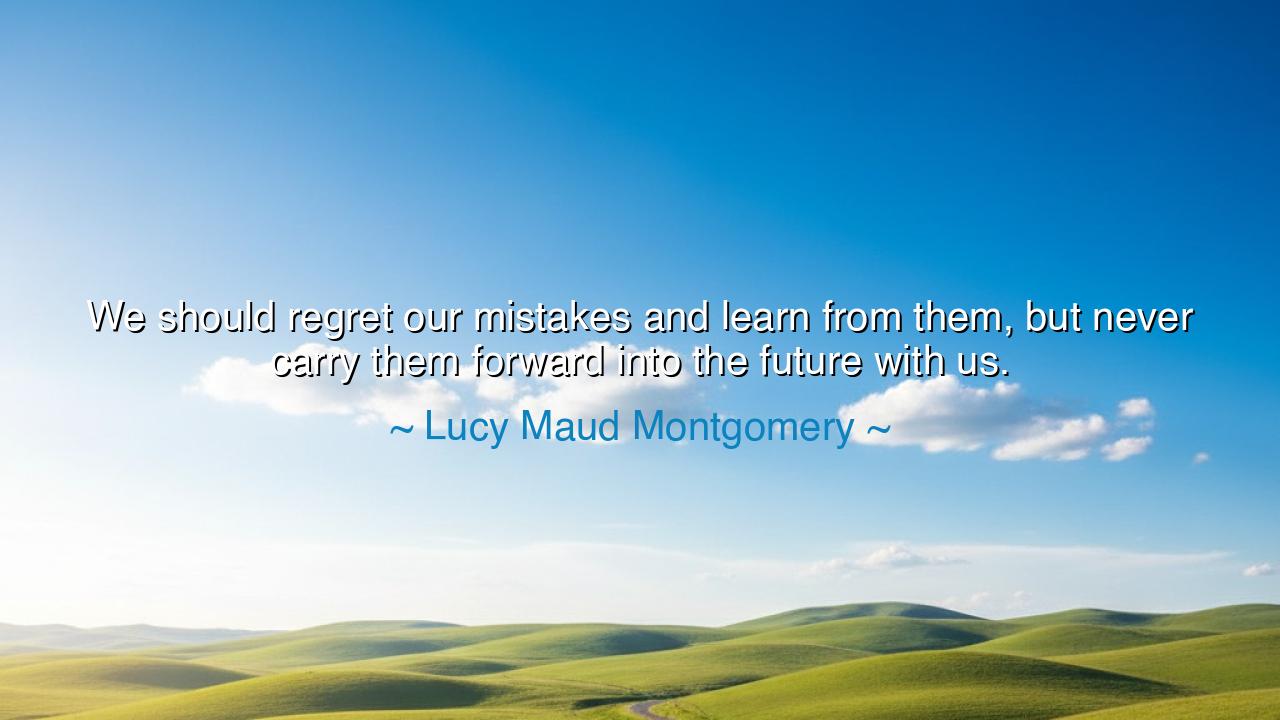
We should regret our mistakes and learn from them, but never
We should regret our mistakes and learn from them, but never carry them forward into the future with us.






In the tapestry of life, the mistakes we make are like shadows that follow us through our days. Yet, as Lucy Maud Montgomery wisely states, "We should regret our mistakes and learn from them, but never carry them forward into the future with us." This profound teaching reminds us that while regret has its place in the heart, it must not be allowed to govern the path we walk. Regret, when reflected upon and understood, can be a powerful teacher, guiding us toward wisdom and growth. But if we allow it to cling to our soul, it becomes a heavy burden, one that prevents us from embracing the future with open arms.
The ancient philosophers spoke often of the importance of learning from one's actions, but also of the need to release the past. Socrates, in his pursuit of truth, argued that a wise person is one who reflects on their actions but does not become enslaved by them. The philosopher understood that life was a series of moments, each a new opportunity to shape our destiny. In the same way, Montgomery’s words encourage us to learn from our mistakes, to acknowledge them, but not to allow them to define our future. To carry our errors with us into the present is to bind ourselves to past failures, instead of moving toward the possibilities that lie ahead.
Consider the story of King David of ancient Israel, who, though anointed by God, made many mistakes in his life. He committed adultery with Bathsheba and arranged the death of her husband, Uriah. Yet, in the face of these errors, David did not wallow in regret forever. Instead, he sought forgiveness and took responsibility for his actions. He did not allow his mistakes to define him or hinder his future. In fact, despite his failures, he became a man after God’s own heart, as he learned from his transgressions and used those lessons to shape his leadership. David’s life teaches us that mistakes are not final, but can be transformed into stepping stones toward redemption and growth.
The Stoic philosophers, such as Epictetus, also taught that one should not be controlled by past wrongs. In his writings, Epictetus urged his followers to release the past and focus on the present moment. "We cannot choose our external circumstances," he said, "but we can always choose how we respond to them." This philosophy aligns closely with Montgomery’s wisdom. Our mistakes may be a part of us, but they do not have to shape our future unless we allow them to. By focusing on what is within our control—our present actions and decisions—we can build a future that is not constrained by past missteps.
In more recent history, the example of Nelson Mandela illustrates this principle with profound clarity. Imprisoned for 27 years, Mandela had every reason to carry the weight of anger and resentment with him throughout his life. But instead, he chose to forgive and release the injustices of the past. His focus was on the future of South Africa, not on the mistakes and wrongs of his oppressors or his own imprisonment. Mandela’s ability to forgive and move forward became the key to his success, both as a leader and as a symbol of hope for millions. In his example, we see the power of learning from the past without allowing it to control the future.
The lesson from Montgomery’s words is clear: regret has its place, but it must not become a prison. We are not defined by the mistakes we make, but by the choices we make in the present and the future. To carry our past failures with us is to anchor ourselves in the waters of what cannot be changed. Instead, we must release those mistakes, learn from them, and allow them to guide us toward a brighter and more purposeful path. Life, like the river, flows forward, and we must not let the weight of the past pull us under.
Let us take this wisdom into our own lives. When we make mistakes, let us acknowledge them, learn from them, and then release them. Do not allow them to shape the future we are building, but use them as tools for growth and self-improvement. Each day is an opportunity to begin anew, to step forward with purpose and clarity. Like the great leaders and thinkers before us, we too can choose to learn from our past, forgive ourselves, and focus our energy on the possibilities ahead. In doing so, we free ourselves to create a life that is defined not by past mistakes, but by the wisdom and strength we gain from them.






AAdministratorAdministrator
Welcome, honored guests. Please leave a comment, we will respond soon